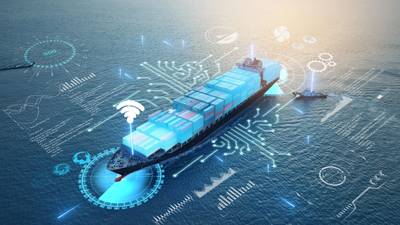Maritime and Mastering a Zero-Carbon World
Managing risk to embrace enabling technologies can build resilience amid volatility, says OrbitMI
Embracing enabling technologies necessary to navigate greener seas can be a market differentiator for maritime leaders as adopting data-driven business processes can build resilience amid increasing volatility - but this also means managing innovation risk, according to OrbitMI CEO Ali Riaz.
Shipping faces an increasingly complex and rapidly changing environment, with market volatility driven by evolving environmental and other regulation, as well as operational factors such as higher costs, fluctuations in cargo demand and crew shortages, and macro issues like economic and geopolitical turbulence at the global level.
Amid this perfect storm, having rapid access to reliable data to inform operational decision-making will be vital to tackle the forces of change and this will demand an effective strategy for digital transformation to deliver competitive advantage, Riaz believes.
Burden or opportunity?
“Compliance with existing and emerging regulations can either be seen as a burden or a business opportunity. By taking advantage of change and implementing enabling technologies at an early stage, it is possible to turn an apparent liability into an asset through process automation to boost efficiency,” says the head of New York-based software-as-a-service company OrbitMI, which has forged a partnership with class society Bureau Veritas (BV) to support digital transformation in maritime.
“The zero-carbon world is here to stay. Rather than fight that reality, industry players need to learn how to master it,” Riaz says. Shipping is leveraging AI machine learning and data-sharing for gains in operational efficiency.
Shipping is leveraging AI machine learning and data-sharing for gains in operational efficiency.
Image courtesy 123RF
He adds: “An important element of a transformation strategy is management of the economic, technological and operational risk factors with innovation. This entails balancing the initial digital investment against potential savings in areas such as fuel consumption, ensuring the digital solution is fit for purpose and assessing the impact of implementation on ship operations.“Consequently, sound technology adoption requires a thorough decision-making procedure underpinned by knowledge of the process to be automated, an understanding of end-user needs, the compatibility and capability of the solution, and proper vendor evaluation as best practice.”
Riaz states that shipping can learn lessons from other industries such as financial, software and life sciences where risk-savvy players that acted early in response to regulation to sharpen efficiency and better manage information flows have emerged as the commercial winners.
“What these industries have in common is that in order to undergo transformation they had to grapple with the issue of transparency in terms of data-sharing and protection. Like shipping, they also faced pressure from governments, regulators, financial institutions and the public,” he says.
Data analytics for competitive advantage
Research firm McKinsey & Company has highlighted how application of data and analytics can be leveraged in shipping to gain competitive advantage and unlock value, stating that digital technologies can “help companies navigate these choppy waters” ahead of the next downcycle by enabling prompt decision-making, operational and cost efficiencies, and improved performance.
“Smart companies are using their cash to invest now in transformation, making them resilient for the next cycle. Much of this transformation requires an upgrade in digital capabilities. Done right, this can enable the emergence of modern, data-driven companies with excellent intelligence to support their commercial and cost decisions,” the firm states.
According to McKinsey, data and analytics are a key enabler for a transformation framework comprising the three main value-creation pillars for shipping companies - strategy, commercial excellence and vessel-cost optimization.
In terms of strategy, shipping companies can draw on data and analytics to improve decision-making around fleet composition, such as by combining forecasts for cargo demand and vessel capacity to predict supply-demand imbalances for specific vessel segments.
Optimized decision-making for cost savings
On the commercial side, revenue can be boosted through data-informed decisions around fleet deployment, pool partnering and time chartering in and out, making it possible to optimize fleet positioning based on the evolution of cargo flows. Furthermore, local meteorological data on weather, wind, currents and waves can be combined with real-time views of port traffic, congestion and terminal activities to optimize routes, fuel consumption and port turnaround time, as well as manage delays and just-in-time arrivals.
 “Compliance with existing and emerging regulations can either be seen as a burden or a business opportunity. By taking advantage of change and implementing enabling technologies at an early stage, it is possible to turn an apparent liability into an asset through process automation to boost efficiency, says OrbitMI CEO Ali Riaz
“Compliance with existing and emerging regulations can either be seen as a burden or a business opportunity. By taking advantage of change and implementing enabling technologies at an early stage, it is possible to turn an apparent liability into an asset through process automation to boost efficiency, says OrbitMI CEO Ali Riaz
Image courtesy OrbitMI
Operational cost savings can be realized by using digital tools that can collect and analyze data to identify trends, optimize crewing spend and overall procurement of spares, stores and provisions, while also streamlining repair, maintenance, port, drydocking and bunkering costs.
McKinsey cites an example of how a shipping operator was able to optimize fuel consumption through a digital interface between the vessel and shore office that provided visibility on fuel and emissions data, and transparency on voyage decisions. This gave clarity on key levers such as speed, slip, trim and fuel type, and allowed AIS and weather data to be leveraged for route mapping and fuel usage, resulting in a 1% decrease in fuel spending while also promoting healthy competition among captains to improve voyage performance.
The firm estimates that companies pursuing digital transformation have seen significant EBITDA gains of 15-20% on a run-rate basis, while also “future-proofing their businesses, solidifying their decarbonization plans and building in resiliency, resulting in higher shareholder value”.
‘Fast to deploy and future-proof’
However, as Riaz points out: “It is important to understand that transformation and transparency cannot happen at scale unless technology is fast to deploy, easy to use and designed to be future-proof.”
And he believes effective technology adoption requires a cultural shift away from siloed data systems, which slow down business processes and hinder efficient decision-making, to data-sharing between different systems and company departments. This can generate what OrbitMI calls intelligent connected workflows, which are used in its Orbit vessel performance platform to create more value from data across pre-fixture, voyage and post-fixture processes.
“Point solutions may deliver some benefits for specific tasks but standalone software operating within a data silo is, ultimately, counterproductive to the data-driven culture we need to achieve real transformation,” Riaz says.
“The focus should be on adopting technologies with collaboration, integration and data-sharing at their core, so that they are both integrable with existing IT infrastructure and scalable for future needs. This can create unified solutions with a single source of truth for better decision-making, rather than having divergent data from segregated systems.”
‘Getting data flowing’
His view is supported by research firm Thetius’ recent study entitled ‘Common Interest’, published together with BV, that states “sharing data has the potential to yield transformative returns on the investments in time, technology and capital resources”.
“To move ahead with the technological evolution of the shipping industry at scale, liberating data and improving its liquidity is of vital importance... Getting data flowing is akin to turning on the fuel taps for digitalization and transformation in shipping,” according to the report.
OrbitMI accomplishes this data flow by integrating multiple APIs from various software suppliers into its platform to enhance functionality and value for the end-user. Moreover, its tie-up with BV aligns the latter’s vast data resources and deep science with the AI-driven analytical expertise of OrbitMI to accelerate digital transformation in the industry, according to Riaz.
“This partnership demonstrates the importance of data quality and transparency in maritime, which are essential ingredients for technology adoption if the industry is to progress on its transformation journey towards the twin goals of sustainability and profitability,” he concludes. About the Author: Steve Marshall is a business writer with long experience in maritime and offshore media, having worked for leading industry publications TradeWinds and Upstream, and now with media consultancy Blue-C.
About the Author: Steve Marshall is a business writer with long experience in maritime and offshore media, having worked for leading industry publications TradeWinds and Upstream, and now with media consultancy Blue-C.

















